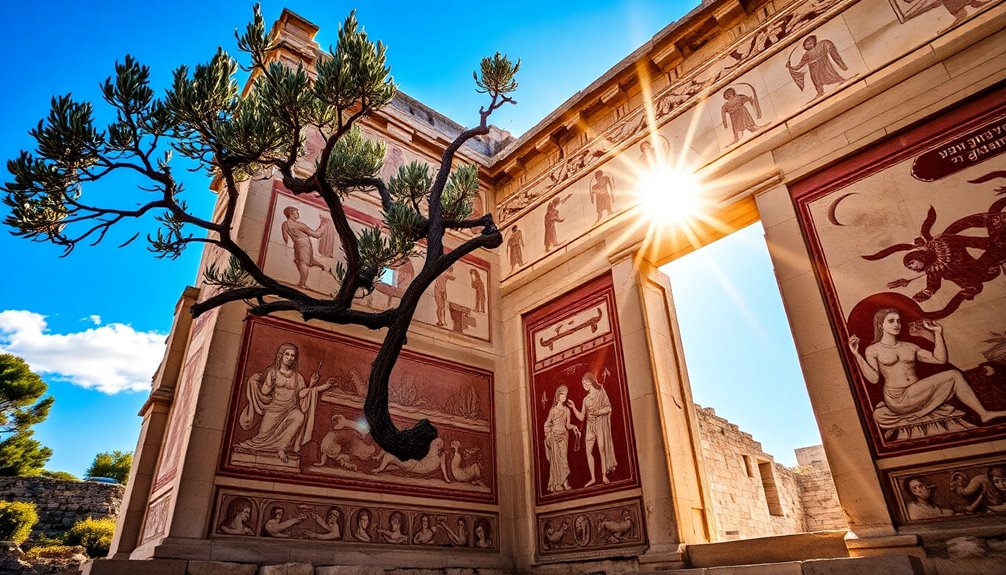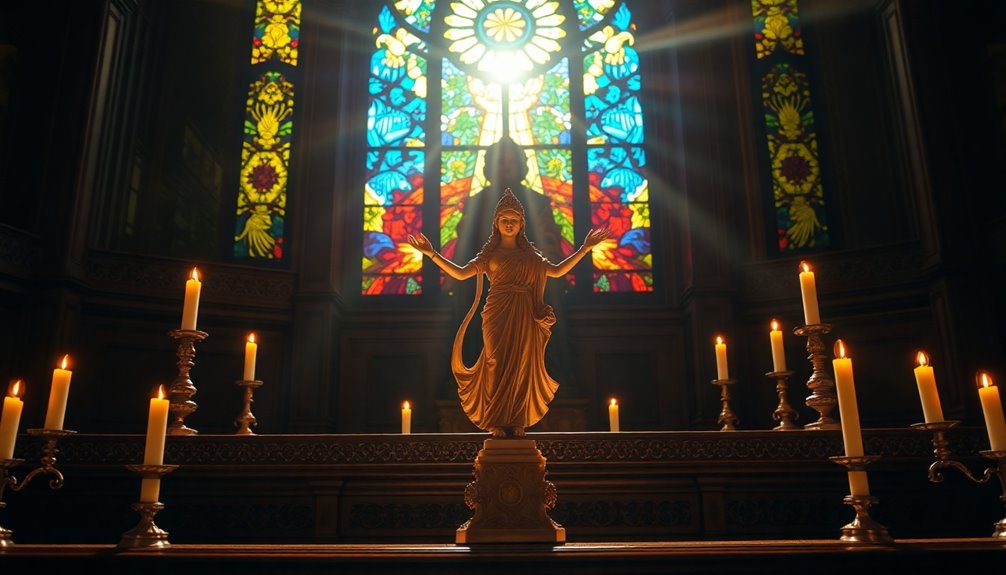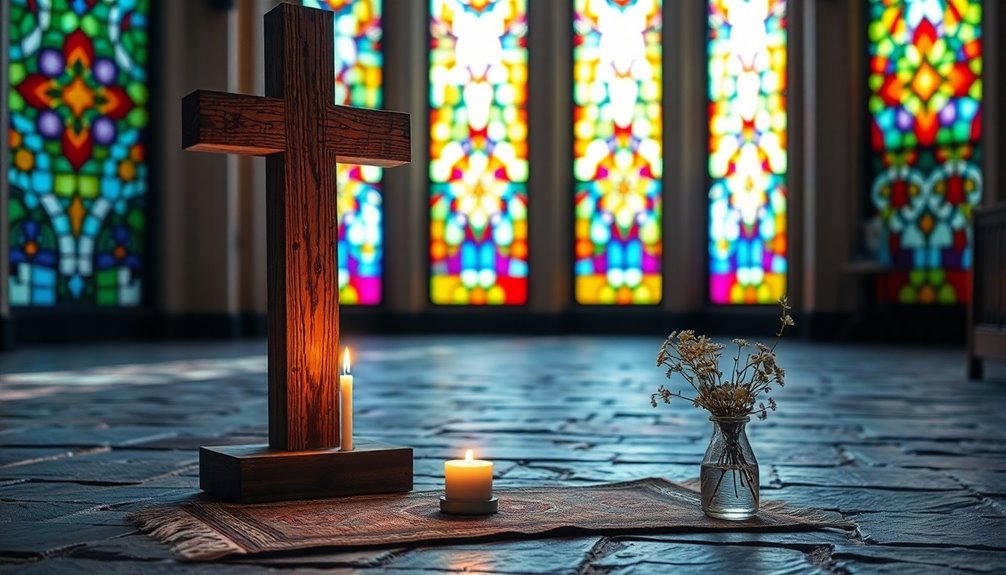God serves as the ultimate source of creation and morality in many cultures. You might encounter different interpretations across religions, with monotheism focusing on a singular divine presence, while polytheistic beliefs embrace multiple deities. Key attributes, such as omnipotence and omnipresence, shape our understanding of the divine. Scriptural texts like the Bible and the Quran provide profound insights into these characteristics. Through daily spiritual practices—like prayer and meditation—you can strengthen your connection to God. If you explore further, you'll uncover even deeper insights about God's nature and influence throughout human history.
Key Takeaways
- "God" signifies a supreme being associated with creation, morality, and is interpreted differently across cultures and languages.
- Monotheistic religions like Christianity and Islam view God as omnipotent, omnipresent, and benevolent, with complex philosophical implications.
- Ancient beliefs featured a pantheon of gods, impacting human experiences and cultural practices, contrasting with modern monotheistic perspectives.
- Daily spiritual practices, such as prayer and meditation, foster a deeper connection to God and community among believers.
- Exploring religious texts and philosophical debates enriches understanding of God's nature and existence, addressing diverse beliefs and interpretations.
Introduction

When exploring the concept of "God," it's essential to recognize its profound significance across cultures and religions. The term "Dios," which translates to "God" in Spanish, embodies not just the idea of a supreme being but also represents creation and morality in various religious contexts.
You'll find linguistic variations of "Dios" in many languages, such as "God" in English and "Dieu" in French, each reflecting unique cultural interpretations of divinity.
Historically, the term has appeared in religious texts and practices, playing a crucial role in monotheistic religions like Christianity and Islam. Understanding its etymology reveals that "Dios" traces back to the Latin "deus" and further to Proto-Indo-European roots associated with the sky or heaven. This connection illustrates how deeply rooted the concept of God is in human history.
Moreover, "Dios" influences art, music, and literature, becoming a symbol of the divine in various traditions and narratives.
Scriptural Insights on God

When exploring scriptural insights on God, you'll find rich references that paint a vivid picture of His nature.
Primary texts like Genesis and Psalm 139 highlight His role as Creator and His omnipresence, while the New Testament introduces the concept of the Trinity.
Together, these scriptures offer a deeper understanding of God's character and His relationship with humanity.
Primary Bible References
The Bible offers a rich tapestry of references that reveal the nature and character of God. You'll find various names and titles used for Him, like Yahweh in Exodus 3:14 and Elohim in Genesis 1:1. These names reflect different aspects of His nature and His relationship with humanity.
In Genesis 1:26-27, God creates humanity in His own image, establishing the intrinsic worth and dignity of every person.
God's omnipotence shines through in Jeremiah 32:17, where it declares that nothing is too hard for Him. This reinforces the belief that His power knows no limits. Additionally, Psalms 139:7-10 highlights His omnipresence, assuring you that there's no place you can go to escape His presence, emphasizing His constant involvement in your life.
The New Testament further reveals God's profound love through the sacrificial act of Jesus Christ. John 3:16 reminds you that God gave His only Son for your salvation, illustrating the depth of His commitment to humanity.
Each of these scriptures not only provides insight into who God is but also invites you to explore a deeper relationship with Him.
Secondary Bible References
Building on the rich insights from primary references, secondary Bible references further illuminate God's nature and attributes. The term "Dios" you find in Spanish translations captures the essence of monotheism central to Judeo-Christian beliefs.
Scripture extensively highlights God's omnipotence in Revelation 19:6, affirming His supreme authority, while Psalm 139:1-4 explores His omniscience, showcasing His profound knowledge of all things.
In the New Testament, when Jesus refers to God as "Father" in Matthew 6:9, it emphasizes the personal relationship you can cultivate with the divine. This intimacy reflects a deeper understanding of God beyond mere titles, inviting you into a familial bond.
The Book of Genesis starts with "In the beginning, God created the heavens and the earth" (Genesis 1:1), underscoring God's role as the Creator, foundational to biblical theology.
Additionally, the concept of the Trinity—Father, Son, and Holy Spirit—reveals God's multifaceted nature. Matthew 28:19's call for baptism in the name of all three persons invites you to engage with the diverse expressions of God's presence.
Together, these references deepen your understanding of who God is and His relationship with humanity.
Ancient Near Eastern Beliefs

In the Ancient Near East, a vibrant tapestry of beliefs flourished, centering around a rich pantheon of gods and goddesses who influenced every facet of life. You'd find deities like Anu, the sky god, Enlil, the god of wind and storms, and Inanna, the goddess of love and war, each embodying critical aspects of nature and human experience.
These gods weren't just distant figures; they played active roles in daily affairs, guiding everything from fertility to warfare. Religious texts such as the Enuma Elish and the Epic of Gilgamesh reveal how ancient peoples understood creation and the gods' involvement in human lives. You'd see how these narratives shaped their views on existence and the quest for immortality.
Temples, known as ziggurats, served as sacred spaces where you could witness rituals and offerings, highlighting the connection between the divine and earthly realms. Moreover, the concept of divine kingship permeated society. Rulers were often seen as intermediaries between the gods and the people, reinforcing their authority through a belief in divine sanction.
In this vibrant world, gods were ever-present, shaping the beliefs, practices, and governance of the people.
Symbolism in Divine Representation

Throughout history, the way people visualize and represent the divine has varied dramatically across cultures, reflecting their unique beliefs and values. The symbolism of "Dios" often includes attributes like omnipotence, omniscience, and omnibenevolence, portraying the ultimate moral authority in various religions.
When you look at religious art, you'll notice that Dios is frequently depicted using light and nature, symbolizing purity, divinity, and the connection between the sacred and the earthly realm.
Different cultures express their understanding of Dios through unique iconography. For instance, in Christianity, the cross serves as a powerful symbol, while sacred animals play a significant role in polytheistic traditions. In monotheistic religions, the concept of Dios emphasizes unity and singularity, contrasting sharply with polytheistic depictions that embrace diverse aspects of the divine.
Moreover, festivals and rituals dedicated to Dios act as communal expressions of faith, reinforcing cultural identity and collective values within religious communities.
These symbols and practices not only help you connect with the divine but also foster a sense of belonging within your culture. Understanding these representations deepens your appreciation of the diverse ways humanity seeks the sacred.
God's Nature and Human Understanding

When you think about God's nature, you might find that misconceptions often cloud your understanding.
There are alternative interpretations of God that can shed light on these misunderstandings and enrich your spiritual perspective.
Exploring these views can help clarify how you relate to the divine and navigate your moral compass.
Debunk Common Misconceptions
Many people hold misconceptions about God's nature, often viewing divine attributes through a human lens. This anthropomorphic interpretation leads to misunderstandings about qualities like omnipotence, omniscience, and omnibenevolence.
For instance, you might struggle with the concept of a benevolent God in a world filled with suffering. This dilemma, known as theodicy, highlights the complexity of reconciling God's nature with human experiences.
Understanding God's immanence and transcendence also complicates simplistic views. Some believe God is intimately involved in daily life, while others see Him as a distant creator.
Both perspectives offer valuable insights but can mislead if taken too literally.
Moreover, various religious traditions shape our understanding of divinity. Monotheistic faiths often portray God as a singular, all-powerful being, while polytheistic beliefs celebrate multiple deities, each embodying different aspects of the divine.
Lastly, philosophical debates surrounding God's existence reveal the ongoing struggle to comprehend divinity. Theistic and atheistic arguments reflect a deep human desire to understand what God truly is, urging you to question and explore beyond surface-level interpretations.
Alternative Interpretations of God
Alternative interpretations of God abound, reflecting diverse human experiences and cultural contexts. Philosophical discussions often explore attributes like omnipotence, omniscience, and omnibenevolence, leading to various understandings of divinity.
You might find that different religious traditions emphasize different aspects of God, from the intimate immanence felt in daily life to the distant transcendence seen in grand cosmic narratives.
Theodicy plays a crucial role in these discussions, as it grapples with the existence of evil in a world governed by a benevolent and all-powerful God. This debate can shape how you perceive human suffering and divine morality, prompting deep reflection on life's challenges.
Moreover, contemporary dialogues around faith and reason reveal a growing interest in reconciling scientific understanding with spiritual beliefs. You may notice how this evolution challenges traditional views, pushing you to reconsider what God means in the light of modern knowledge.
Cultural context significantly influences your understanding of God too. Whether you're exploring monotheistic or polytheistic practices, you'll see that varying representations of the divine illustrate the intricate tapestry of human interpretations.
Embracing these diverse views enriches your spiritual journey and broadens your comprehension of the divine.
Daily Spiritual Practices

Daily spiritual practices can transform your connection with the divine, making them essential for many.
Whether you establish a morning prayer routine or participate in community worship activities, these rituals create a sense of belonging and purpose.
Daily Prayer Routines
Incorporating a daily prayer routine can significantly enhance your spiritual life and foster a deeper connection to your beliefs. You might find that structured prayer times, like morning prayers to set your intentions and evening prayers for reflection and gratitude, help you stay grounded throughout the day.
Your prayer routine can be unique, tailored to reflect your personal beliefs and spiritual goals. Consider using prayer beads, such as rosaries or malas, to maintain focus and count repetitions during your prayers. This simple tool can help you deepen your concentration and enhance your experience.
Additionally, blending practices like meditation and mindfulness into your routine can elevate your spiritual connection and self-awareness. These practices encourage you to be present and centered, allowing you to connect more profoundly with your faith.
Journaling your prayers or spiritual reflections can also be an invaluable tool. It enables you to track your spiritual growth and deepen your understanding of your beliefs over time.
Community Worship Activities
Community worship activities enrich your spiritual journey by bringing individuals together in shared practices. Daily prayer sessions often serve as a cornerstone, where members gather to express gratitude, seek guidance, and cultivate unity in their spiritual lives. These gatherings create a warm, welcoming atmosphere that fosters connection and support.
Many communities also host daily scripture readings or devotional meetings. Here, you can reflect on sacred texts, share insights, and deepen your understanding alongside others. Singing hymns or participating in communal worship music elevates the experience, filling the space with joy and uplifting energy that enhances spiritual connection.
Engaging in service projects as a form of worship is another impactful activity. Dedicating time daily to help those in need reinforces compassion and strengthens community bonds.
Additionally, many communities incorporate daily meditation or mindfulness sessions, allowing you to deepen your spiritual awareness and connection to the divine.
These community worship activities not only nurture your individual spiritual growth but also create a sense of belonging and purpose among participants, enriching your overall experience and connection to something greater.
Embrace these practices; they can transform your spiritual journey.
Final Thoughts on Divinity

Divinity, a complex tapestry woven from diverse beliefs and cultural expressions, invites us to explore the profound questions of existence and morality. You'll find that interpretations of divinity vary widely, from the singular omnipotent being of monotheistic faiths to the many gods of polytheistic traditions, each representing different aspects of the divine.
These varying beliefs often spark philosophical debates about God's nature and existence, tackling issues like the problem of evil and the relationship between faith and reason.
In religious frameworks, divinity embodies qualities such as omnipotence, omniscience, and omnibenevolence. These attributes shape moral and ethical teachings, guiding adherents in their daily lives.
You may also notice that cultural representations of divinity manifest through art, literature, and rituals, showcasing the myriad ways societies celebrate the sacred.
The term "Dios," meaning "God" in Spanish, highlights the linguistic and cultural significance of divine references. It reminds us that language not only shapes our understanding of the sacred but also connects us to the broader human experience of grappling with questions about the divine.
Ultimately, exploring divinity encourages you to reflect on your beliefs and values within a rich, diverse context.
Additional Resources

Exploring the concept of Dios opens up a wealth of resources that can deepen your understanding of divinity across cultures. To start, consider delving into religious texts from monotheistic faiths like the Bible or the Quran, which offer insights into how Dios is perceived as a supreme being.
Additionally, exploring polytheistic traditions, such as Hinduism or ancient Greek religion, can help you appreciate how Dios can represent one of many divine figures.
Linguistic resources are also invaluable. Investigate the etymology of "Dios" through sources like dictionaries that trace its roots back to Latin "deus" and Proto-Indo-European "deywós." This historical context can enrich your perspective on its significance.
Philosophical works discussing existence, morality, and the nature of the divine can further enhance your understanding. Authors like Søren Kierkegaard or Friedrich Nietzsche present compelling arguments that challenge conventional views.
Lastly, consider contemporary discussions in forums or online platforms that engage with these themes. Engaging with diverse perspectives won't only broaden your understanding but also enhance your appreciation for the complexities surrounding the concept of Dios.
Frequently Asked Questions
What Does Dios Mean?
When you hear the term "dios," it generally means "god" in Spanish. It signifies a supreme being or deity, often associated with various religious beliefs.
In monotheistic faiths, it represents a singular, all-powerful entity. In contrast, polytheistic traditions may interpret "dios" as one among many gods.
This concept can also extend to nature or ancestral spirits in indigenous beliefs, highlighting diverse interpretations of divinity across cultures.
Why Is God Called God?
God's called "God" mainly due to linguistic evolution, tracing back to the Proto-Indo-European root "deywós," which means divine or heavenly.
In monotheistic traditions, this title reflects the being's supreme qualities like omnipotence and omniscience.
You'll notice that different cultures use various names, but they all point to the same concept of a higher power.
This title has adapted over time, mirroring humanity's changing perceptions of the divine.
What Is the Full Meaning of Dios?
The term "Dios" translates to "God" in English, representing a supreme being across various religions.
It's derived from the Latin word "deus," which connects to the Proto-Indo-European root for divinity.
In many belief systems, Dios embodies ultimate power, knowledge, and goodness.
This idea shapes moral codes and influences cultural expressions, including art and literature.
How Do You Treat Dios?
To treat the divine with respect, you start by recognizing its significance in your life.
Engage in personal reflection or prayer, expressing gratitude and seeking guidance.
Participate in community rituals that celebrate shared beliefs, fostering a sense of belonging.
Study religious texts to deepen your understanding of its attributes and teachings.
Lastly, embrace the moral principles associated with the divine, allowing them to guide your behavior and interactions with others.










